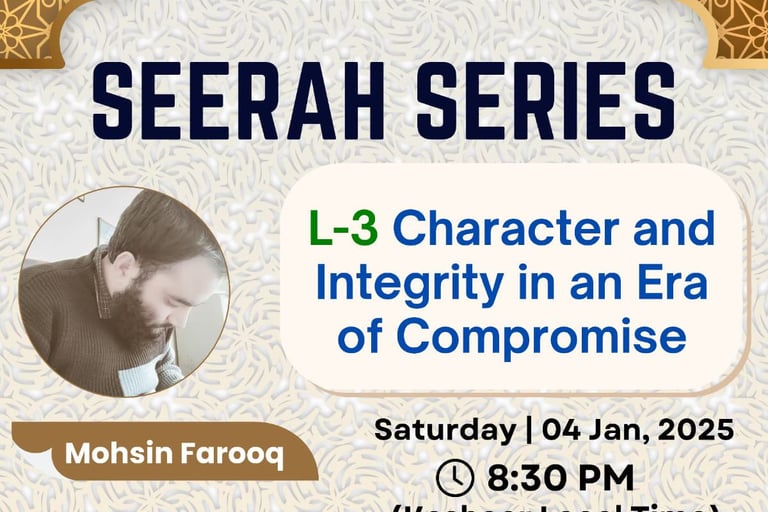Fairness and Trust in Times of Corruption and Deceit
CULTUREEDUCATION
Prophet Muhammad (peace be upon him) consistently set a high standard for ethical conduct by countering corruption and deceit with unwavering fairness. His personal title, “Al-Amin” (the Trustworthy), reflected a life devoted to honesty in all matters, from business dealings to public governance.



Prophet Muhammad’s (SAW) Enduring Legacy
Throughout his life, Prophet Muhammad (peace be upon him) established a moral framework based on honesty, integrity, and justice. His teachings and personal example have guided countless generations in building communities based on fairness and ethical conduct. In this post, we delve deeply into his multifaceted approach—spanning his business dealings, public governance, and personal interactions—to illustrate how he countered corruption and deceit while promoting fairness.
I. The Prophet’s Personal Integrity and Business Ethics
A. A Reputation for Trustworthiness
Even before his prophethood, Muhammad was renowned as “Al-Amin” (the Trustworthy) among the people of Mecca. As a merchant, he conducted business with transparency and fairness, ensuring that every transaction was characterized by honesty and clear communication. His personal integrity was not just an economic asset—it was a moral statement. In a society where deceit was common, his commitment to truth and fair dealing set him apart and sowed the seeds for the ethical principles that would later underpin the Islamic community.
B. Principles in Commercial Dealings
The Prophet’s business practices were marked by a refusal to engage in any form of dishonesty. He mandated that all parties in a transaction fully disclose any defects or shortcomings of a product. He believed that hidden faults or misrepresented qualities not only defrauded the buyer but also eroded the social fabric of trust. By insisting on honest disclosure and fair pricing, he countered corruption at its very source—commercial deception. This commitment to ethical trade is echoed in later Islamic teachings where bribery and extortion are strictly condemned as acts that undermine communal trust and social justice.
II. Governance, Accountability, and the Fight Against Bribery
A. Establishing Fair Systems in Early Islamic Society
Once the Muslim community was established in Medina, the Prophet’s role expanded from that of a merchant to that of a statesman and community leader. He instituted administrative systems that emphasized accountability and transparency. One prominent example is his approach to public finance and resource management. The concept of the public treasury (Bayt al-Mal) was introduced to ensure that wealth collected from the community was used for the common good. By centralizing financial resources and enforcing strict guidelines for their use, he minimized opportunities for personal gain at the expense of the community.
B. A Clear Prohibition on Bribery
Prophet Muhammad (peace be upon him) was unequivocal in his denunciation of bribery. He is reported to have said, “The curse of Allah is upon the one who gives a bribe and upon the one who takes it.” Such statements were not only moral admonitions but also practical measures designed to maintain justice and impartiality in governance. By disallowing bribery, he ensured that decisions—whether in judicial matters or public administration—were made based on merit and fairness, not on undue influence or corruption. This stance helped to establish a culture in which every citizen could expect a degree of equality before the law.
C. Fair Appointments and Avoidance of Nepotism
In his administrative practices, the Prophet placed immense importance on merit and trustworthiness when appointing individuals to positions of responsibility. He rejected nepotism and favoritism, insisting that leadership be granted to those best suited to uphold justice. By setting high standards for public office and holding officials accountable, he laid the groundwork for a system in which fairness was paramount. His method of scrutinizing the character and capabilities of his advisors and administrators serves as a timeless model for ethical governance.
III. Confronting Deceit: Lessons from the Prophet’s Life
A. Addressing Dishonesty in Personal Interactions
One of the core teachings of Islam is that truthfulness is the essence of faith. The Prophet’s own words—“Whoever deceives us is not one of us”—emphasize that any form of deceit, whether in speech or action, is antithetical to the values of the Muslim community. He actively admonished his followers against falsehood, knowing that even small acts of dishonesty could erode trust within families and society at large.
B. Handling Hypocrisy and Internal Deceit
The early Muslim community faced the challenge of hypocrites—those who outwardly embraced Islam while secretly harboring ulterior motives. The Prophet entrusted sensitive information to companions like Hudhayfah ibn al-Yaman, whose ability to safeguard secrets was crucial in identifying and countering internal deceit. By confronting hypocrisy head-on, he prevented subversive elements from undermining the unity and moral integrity of the community.
C. The Role of Sincere Correction
In instances where deceit had taken root, the Prophet’s approach was corrective rather than purely punitive. He urged individuals to repent and seek forgiveness, emphasizing that moral reform was always possible. His approach combined stern warnings with opportunities for redemption, ensuring that the focus remained on restoring justice and rebuilding trust rather than on vengeance.
IV. Fairness in Social and Legal Justice
A. The Conquest of Mecca: A Model of Magnanimity
Perhaps one of the most illustrative examples of the Prophet’s commitment to fairness is found in the Conquest of Mecca. After years of persecution and conflict, when he finally took control of Mecca, he chose forgiveness over retribution. Instead of seeking vengeance against those who had opposed him, he granted amnesty and restored the rights of many. This act of clemency not only defused lingering hostilities but also reinforced the principle that true strength lies in mercy and fairness.
B. Ensuring Equality and Justice for All
In his final sermon, the Prophet underscored the universal nature of justice by declaring that no Arab is superior to a non-Arab, nor is a non-Arab superior to an Arab, and similarly for any other group. This radical declaration of equality was a direct counter to the tribal and hierarchical norms of pre-Islamic Arabia. By establishing equality as a core value, he provided a powerful antidote to corruption and bias, ensuring that every individual was entitled to fairness irrespective of social status or lineage.
C. Commanding and Forbidding: A Collective Duty
Another key aspect of his ethical framework was the concept of enjoining what is right and forbidding what is wrong. He taught that it is the duty of every believer to stand against corruption, deceit, and injustice. Whether through direct action or by speaking out against unethical practices, the collective responsibility of the community was to uphold the highest standards of moral behaviour. This principle has inspired generations to remain vigilant against corruption in all its forms.
V. Lessons and Legacy for Contemporary Leadership
A. A Blueprint for Ethical Governance
The ethical standards set by Prophet Muhammad (peace be upon him) continue to resonate today, especially in discussions around governance and public administration. His insistence on accountability, transparency, and merit-based appointments serves as a blueprint for modern leaders seeking to combat corruption. By prioritizing the public interest over personal gain, he demonstrated that effective leadership requires both moral courage and practical wisdom.
B. Cultivating Personal Integrity
On a personal level, the Prophet’s life encourages individuals to build their character on a foundation of honesty and fairness. His emphasis on truthfulness in every interaction—from family relations to business transactions—reminds believers that integrity is not a mere option but a religious obligation. The teachings that promote internal and external honesty are essential in fostering an environment where trust can flourish.
C. Continuing the Struggle Against Deceit
The challenge of corruption and deceit is not confined to the past. Today’s world—marked by complex economic systems and multifaceted political structures—presents many of the same ethical dilemmas that the early Muslim community faced. The enduring message of the Prophet is that combating corruption requires constant vigilance, ethical education, and a steadfast commitment to justice. His life shows that meaningful reform is possible when leaders and citizens alike commit to a higher standard of conduct.
Conclusion
Prophet Muhammad’s life is a testament to the transformative power of ethical leadership. By countering corruption and deceit with fairness and integrity, he not only reformed a society steeped in tribal customs and inequality but also established enduring principles that continue to inspire people around the world. His legacy teaches us that true strength lies in honesty and that lasting justice requires a commitment to the welfare of all. In embracing these timeless values, both leaders and individuals can contribute to a more equitable and trustworthy society.
